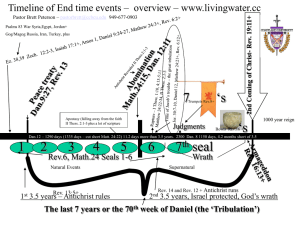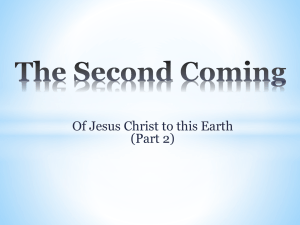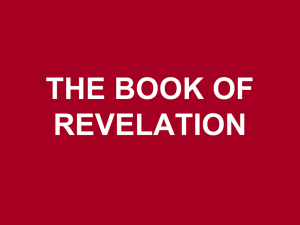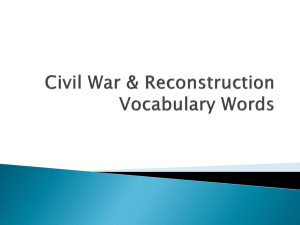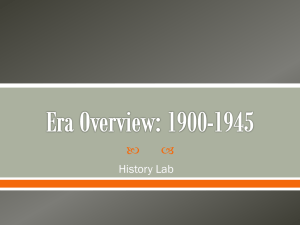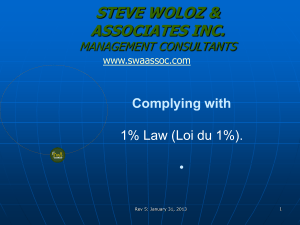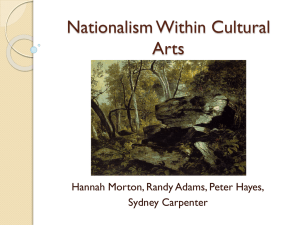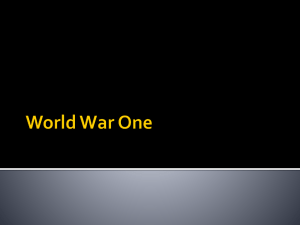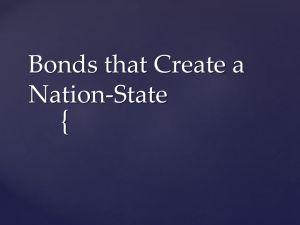Africa, Middle East, LA History 1750-1900 Presentation
advertisement
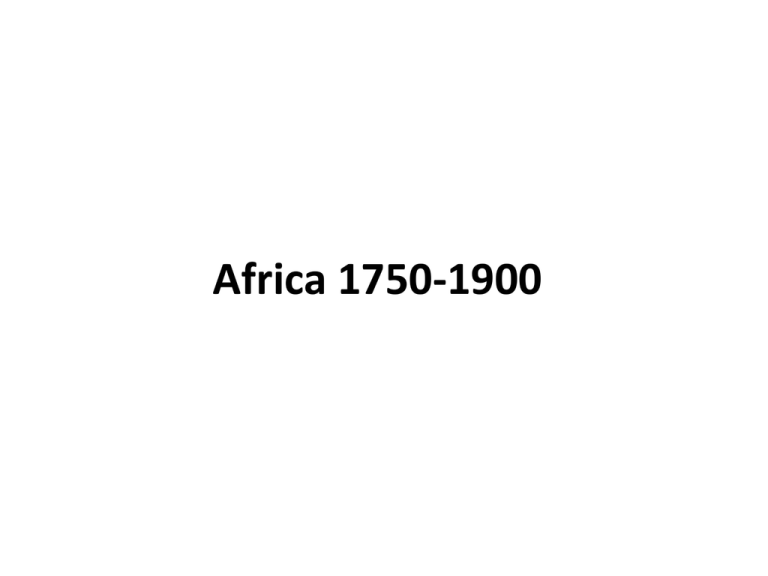
Africa 1750-1900 Africa 1750-1900 Key Concepts • African empires still strong • End of the Atlantic slave trade • Scramble for Africa African Empires Zulu in South Africa • Conflict over grazing land and drought • Moves from clan-structure to centralized power Sokoto Caliphate in West Africa • Muslim in push for more adherence to shari’a law • Keep it a center of Islamic learning • Traditional religions were suppressed • Largest empire in W. Africa Africa 1750-1900 Slave Trade • Sharp decrease in pop, but doesn’t have a big impact on the overall pop rates • Revs. & moral factors push for an end to the slave trade (Denmark, England then U.S.) • British patrol the west coast, pushing the illegal trade farther south and to the east (trade in the east already going on for decades) • After 1825-bigger demand for gold, ivory and palm oil • Trading companies in Africa, using slave labor • Now trade raw materials for western industrial imports Africa 1750-1900 Egypt & Ethiopia • Big push for westernization and nationalism • Muhammad Ali begins modernizing Egypt based on the French model and starts building a modern arm (western training and guns) • Builds lots of railroads and infrastructure • High cost, so he forced the peasants into the army and grow cotton for exports • Encourages nationalism by embracing islamic culture • Ethiopia also modernizes and starts buying western weapons (attempts to industrialize) and keeps changing alliances with European counties to stay strong Africa 1750-1900 New Imperialism • Major cause was the Industrial Rev – colonies and resources to fuel industrial growth • Bring Africa into the world economy – both as suppliers and consumers • Main materials-gold, diamonds, copper, ivory and cotton • White Man’s Burden – call to civilize Africa • French and Egyptians build the Suez Canal – but dept and low exports forced them to sell their shares (starting England's occupation of Egypt) • French and Belgium's interest in the wealth of the Congo prompted the Berlin Conference “effective occupation” and the drawing up of new territorial boarders • Afrikaners-(Dutch descendents that colonies south Africa) move more north for diamonds setting conflict between them and the British (Boer Wars) and later brinish fight the Zulu and win because of better weapons., then establish colonial holdings on Rhodesia. • Paternalism- treat them like kids and rule over them. (force them to work, pay taxes and follow their rules, law and religion) Middle East 1750-1900 Middle East 1750-1900 Key Concepts • Ottoman empire in declining • Young Turks and Tanzimat sought to reform and to fix the empire, but they stay behind (Sick Man of Europe) • Young Turks crackdown on minorities and allied with Germany prior to WWI • No female reforms and little improvement in life Middle East 1750-1900 Ottomans • Big state of decline • Push for western reform-resisted by the Janissaries • The Crimean War – first modern war – against Russia – fought with aid from France and England (both see Russia as a threat to their trade in this region) • Being fought over territory –long time rivals • Ottoman win, but showcases their declining military power. • England and France use their land (extra territorialism) • Young Turks and the Tanzimat start pushing for reform and westernize Asia 1750-1900 Asia: 1750-1900 India • Mughal are declining- Maratha Confederation starts turning India into states • European trading companies move in and take control over the newly formed states • BEIC becomes the most power by forming alliances with local princes – hiring Sepoys to protect their interest there • Push to reform India, big pop and traditional values makes it difficult to change-breakdown into rebellions (Sepoy biggest) • Queen Victoria colonizes India get rid of the BEIC (tolerance to locals as long as there are loyal) • Civil Service (unfair system—only filled with the British) • Indian National Congress (Pan-Indian Unity) • Start of Indian colleges and universities Asia: 1750-1900 China • Declining phase of the Qing-mass over population • Europeans growing more mad about the canton system • Civil unrest, grand canals are falling apart, resentment towards the “foreign rulers/Qings” failed White Lotus Reb—get rid of Qing and bring back Ming. • British start importing opium (addicted-spending all their silver), government tries to ban in and this leads to a war – Canton system ends, new ports, Hong Kong, extraterritorially (Christians) – Taiping and Boxer Rebellion (resist foreign influence) TR – civil war, BR against Europeans – lead by Empress Dowager Cixi after hopes to maintain traditional ways---it fails and is an ending point of the empire – Also dealing with Japanese (shino-japanese war and rise of Chinese warlords) – Sun Yatsen becomes the new president of the Republic of China—steps down to the nationalist forces of Shikai Asia: 1750-1900 S.E. Asia and the Pacific • BEIC wants more control over this region to secure trade routes (Singapore, Burma and Rangoon) • Clipper Ships are faster and become majority of the British fleet • Captain Cook map out Australia and New Zealand—sparking mass migration to this region and the displacement of local people other die from diseases • Australia starts as a penal colony, discovery of gold is going to spark a rush of people and a push for full colonization of this region. • New Zealand was colonized slowly (the Maori people were the locals) • Both places locals were segregated, forced into reservations and little to no rights • British also take control of Burma (Myanmar) and the French take Indochina (Vietnam) • Growing cash crops, displacing locals (hunter/gathers), large scale migration into this region, and missionaries Lamerica 1750-1900 LA: 1750-1900 Early Revolution & Change • The enlightenment causes changes to the old order • Seven Years War (French and Indian War) high cost, more taxes, new land but not open to the colonist • American Rev – inspired by John Locke’s ideas (French Rev in Europe – Haitian Rev) • Haitian Rev. – White pop starts it based on unfair conditions – slaves up rise and steel the revolution (Toussaint L’Ouverture – takes control..calming freedom and independence – Napoleon capture Toussaint but were once again overwhelmed by locals and armed women – free, but at a high cost. Big social and economic problems LA: 1750-1900 Independence Movements • Napoleon’s brother becomes king of Spain – Junta Central • Local elites (creoles) resisted loyalty to the new government – early attempts put down quickly • Inspired by the enlightenment, but no desire to free the slaves • Simon Bolivar “the liberator” rises to power and decides to free the slaves to gain more support. • Wants to keep these countries unified as “Grand Colombia”, but fails to hold them together • Mexico-(silver piggy bank for Spain) Father Miguel H.-first turns to the elite and then to the poor, captured • Pedro over in Brazil - claims independence end their involvement in the slave trade and struggles to be a liberal leader LA: 1750-1900 Social and Economic Changes: • The Industrial Rev having a big impact on the U.S. • Increase in canals and railroads • Rise in immigration peeps in the U.S., Argentina, & Canada • Trans-Atlantic Telegraph: Underwater telephone line (Communication) & Electricity and the light bulb • Central and South America did not industrialize, so they relied on American goods and Imperialism • Reform Movements are increasing & the Europeans kept the Americans from taking the Natives (Indians) land, but now that the American people are free this leads to conflict. • The Abolitionists are women and slaves who are fighting to promote their own political rights. • Civil War: the end of it marks the end of slavery in the U.S. by the end of the 1880’s slavery is abolished everywhere and Cuba is fighting for its independence. LA: 1750-1900 Other Issues: • Women’s Rights- They demanded voting rights, education, better working conditions, suffrage, • Monroe Doctrine: Claimed LA as the U.S.’s sphere of influence or protectorate from Europe. But the U.S. messes this region By getting in a war with Mexico and Spain by taking over parts of Mexico • The U.S. was not interested in colonizing but in their natural resources Europe 1750-1900 Europe: 1750-1900 Enlightenment: • Scientific revolution- inspires social consciousness and anti absolutism and questions despotism. • Also inspires FR Rev. FR was in big $$ poo- help AM with war and economy in decline because of Louie 14th • Calls on estates general. Doesn't represent 3rd estate properly. They get po’ed- tennis court- national assembly. • Storm Bastille. Starts Rev. New constitution rights for all. • Robespierre- takes over Rev. goes nut. Kills everyone. Dies. • FR at war with Europe=NAPOLEAN- kicks butt- becomes emperor creates Napoleonic code. Equal rights for all men. • Invades Russia, losses men. Gets exiles. Comes back. Exiled again • Effects: Widely felt thru Europe. Congress of Vienna to restore old conservative order, led by Metternich. All nations got land. • Small Revs. Wanting more liberal reforms Quickly put down. Nothing changes. Nationalism takes hold in Greece. Greece independent. Europe: 1750-1900 Industrial Revolution • Starts in England- Enclosure movement. Watermills. Higher urbanization. Big demands for goods leads to mechanization, factory system. Mass production and eventually assembly line. • Women got less pay, for equal pay, less kids, family time went down. Not $$ good • Second phase- steel, electricity, chemicals • Capitalism emerges boots out mechanism- Adam Smith lazzire faire • Karl Marx- socialism. Have and have-not’s. collective ownership, class struggle, working and owners, and to change workers have to rise up to create a classless society, this is where communism comes from. • Form labor unions and benevolent societies , to improve work and living conditions. • 2nd half of 19 century. Labor unions got in politics, used this to get the right to vote. Known as Victorian era. Women return to homes. • GB, new $$ system, had 9/10 global trade, done in pound. Europe: 1750-1900 Russia • Despite peter’s effort to modernize, Russia is backwards in the eyes of Europe. Agrarian society. Almost no middle class. • Main notoriety, defeating napoleon. Russia ally with conservative nations • Roads built to link country, most goods came from west. Industrialism doesn’t take hold • Crimean war showcases inability to modernize. • Pushed for all Slavic people to unite even the ones under Ottoman rule • Influenced by conservative thinking. But liberal reform occurs like emancipation of serfs and land grants 1860’s. Europe: 1750-1900 Nationalism and Unification • Creation of nation based on common language and culture. • With multi-linguistic nations, nationalism was more difficult. Central Europe most difficult. At 1st nationalism was associated with liberalism, conservatives hi-jack it to strength hold on country. Italy and Germany. • GR widely spoken language in Eu. Otto von Bismarck wanted to unite them. Thru war conquering Austria and taking FR land.
